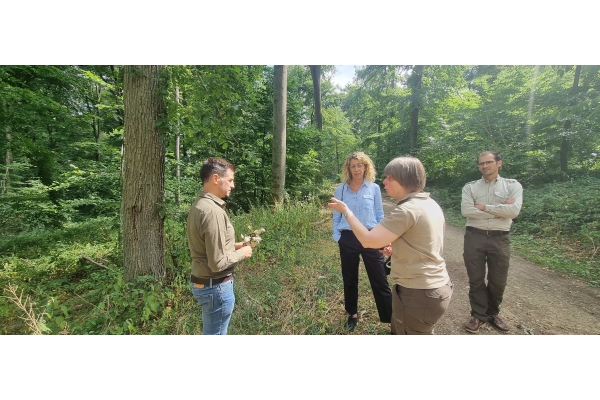 (L-R) Gilles Biver, MECDD; Joëlle Welfring, Minister for the Environment, Climate and Sustainable Development; Martine Neuberg, Administration of Nature and Forests; Pedro Reis, Administration of Nature and Forests;
Credit: MECDD
(L-R) Gilles Biver, MECDD; Joëlle Welfring, Minister for the Environment, Climate and Sustainable Development; Martine Neuberg, Administration of Nature and Forests; Pedro Reis, Administration of Nature and Forests;
Credit: MECDD
On Friday 19 August 2022, Luxembourg's Ministry of the Environment, Climate and Sustainable Development presented an update on the current situation regarding the state of forests and water resources in Luxembourg.
Forest status
Drought combined with the effects of heat waves weakens vegetation, especially trees, which can be observed in forests, among other places. Everywhere one can observe trees and plants in lack of water, as a result, some trees wither and are attacked by secondary parasites such as beetles and fungi.
The Ministry recalled the need to make our forests more resilient to droughts induced by climate change as such droughts are likely to occur more often in the future. The main challenge will be to find the right balance between protective measures to improve the resistance to disturbance of current trees and measures to diversify the structures, species and origins of future trees. This is to avoid possible repeated failures of a strategy based solely on the adaptive capacities of natural regeneration. This can be done by the following measures:
- Strengthening the diversity and complementarity of forest species in forest stands;
- Maintaining and enhancing the genetic diversity of trees in forest stands;
- Increasing the diversity of forest stand structures;
- Improving the resistance capacity of forest trees to disturbances;
- Adaptation of forest infrastructures to future climatic conditions.
But it is not just the plants that are impacted by the lack of water in the forest. Wild animals also suffer from high temperatures, seek to find watering places and show behavioral changes due to high heat.
Water situation
Given the unchanged situation of our rivers, the Ministry further recalled the prohibition of any withdrawal from surface waters, even covered by an authorisation, and to greatly reduce fishing on the rivers.
Streams
Periods of drought are not without consequences for the waterways. In August, some small streams are already dry. A rare and worrying event, never before observed on certain streams. The drop in water levels directly affects aquatic fauna and flora on several levels: low water levels favour an increase in water temperature, which depletes the availability of oxygen for aquatic organisms. Added to this is the increase in the concentration of polluting loads since the dilution effect is lessened by low flow rates.
When watercourses are partially dry, there is a fragmentation of the aquatic environment. The organisms that live there find themselves trapped in a section of stagnant watercourse, depleted in oxygen, with a significant pollutant load, and without the possibility of accessing areas favourable to survival. This is one more argument in favour of carrying out renaturation projects. Indeed, by restoring to waterways their natural dynamics and morphology, the resilience of aquatic ecosystems to these pressures is increased.
The precipitations
Rainfall over the past few days has had no influence on groundwater or river levels. Likewise, only the first centimetres of the ground could have been wet, but the vegetation absorbed everything. It would take at least two consecutive weeks of moderate rain to allow the precipitation to have any influence on the groundwater reservoirs.
Dry soils can currently only absorb water very slowly. In the event of untimely heavy rain, these will immediately flow on the surface and cannot be buffered. This leads to an increased risk of damage from surface runoff and erosion. Bad weather can occur anywhere and therefore no area can be excluded. Critical locations are indicated on the heavy rain hazard map published on geoportal.
Drinking water
Regarding drinking water, the Ministry clarified that there always have been enough reserves in relation to current consumption. However, the Ministry cautioned to stay aware and not to consume more water than needed.








